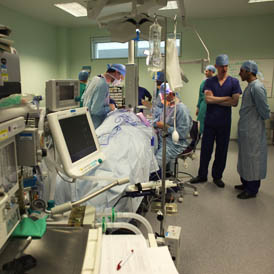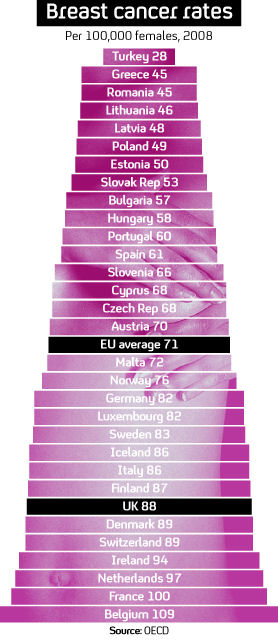Lansley delays NHS reforms amid ‘concerns’
Health Secretary Andrew Lansley delays the NHS reforms amid criticism of the “chaotic” plans. A leading GP tells Channel 4 News change is welcome, but patients and doctors are “totally confused”.
Speaking to MPs Health Secretary Andrew Lansley said the NHS Reform Bill – which is currently in the process of going through Parliament – would be delayed to allow for consultation.
Mr Lansley told MPs there were “genuine concerns” with the proposals, which would see primary care trusts abolished and GPs handed responsibility for commissioning health services.
Taking advantage of a natural break in the progress of the Bill would allow time to “pause, listen and engage”, he said.
But the Health Secretary said the NHS needed to change, although private providers would not be allowed to exploit the new system and “cherry-pick” the most profitable services – a criticism highlighted by opponents of the Health and Social Care Bill.
Earlier, the Labour leader Ed Miliband called on the Government to abandon the NHS shake-up and branded the reforms “extremely dangerous”.
He said changes had to be made in the running of the NHS – but not the way the Government was planning.
In a hard-hitting attack on the Coalition, Mr Miliband described Health Secretary Andrew Lansley’s plans as “chaotic” and warned they would make hospital closures more likely.
Health reform proposals
David Cameron and Nick Clegg are due to launch a “listening exercise” this week in a bid to reassure critics that the reforms are the right thing for the NHS.
Among the proposals, GPs will be handed control of commissioning services by forming consortia which would take control of 80 per cent of the NHS budget by 2013.
NHS reform: bill stalled as 'listening' exercise begins
I can't remember the last time a government launched a consultation in the middle of a bill's progress through Parliament, writes Political Editor Gary Gibbon.
It's not a good sign and it certainly wasn't part of the plan. In the Commons just now, Andrew Lansley has been careful to call it a "listening" exercise not a "consultation" - I'm told this is because the latter term has legal weight and leaves you open to judicial review if you are not carrying it out to the letter of prescribed practice.
To say that Andrew Lansley sounded hugely impressed by his critics and sees the shortfalls of his brainchild would be a little wide of the mark. This statement was no mea culpa. The Health Secretary is said to be frustrated by the headlines of recent days promising a lengthy pause in reforms and a serious re-think, and it showed.
Read more: Bill stalled as 'listening' exercise begins
Amid concern about competition from private companies it has already been stated that organisations will be prevented from “cherry picking” profitable NHS services.
The Bill’s wording is likely to be changed from “any willing provider” of NHS services to “any qualified provider”, meaning all providers would have to meet a set of standards.

Public ‘confused’
Dr Michael Dixon – chair of the NHS Alliance and a General Practitioner for 26 years – told Channel 4 News he welcomed the changes but warned that more clarity was needed.
“The public are totally confused,” Dr Dixon told Channel 4 News.
“What the public now need is the detail of what the reforms involve and it is terribly complex. I was at a meeting of 100 GPs on Saturday and not one understood what it is about.”
Dr Dixon told Channel 4 News that the debate over the reforms should not focus on for and against arguments, but that a compromise would be the right thing for improving the health service.
“There are bits of the reform that are good and bits that need changing,” he said. “At the moment people are either for or against – there are some really positive things, but there are issues which need addressing such as the powers of [the independent NHS regulator] Monitor.
“We mustn’t throw out the baby with the bath water.”
Dr Dixon told Channel 4 News that abolishing Primary Care Trusts for GP consortia was a positive step for patient care.
“GP commissioning would make service for patients better, improve local health and make the NHS more financial sustainable,” he said.
“GPs should no longer be confined to just consultation and should have a handle of what is happening outside consulting room. It would cut bureaucracy and mean I can really help patients.
“Doctors in the past have protested at inability to make a difference. GPs are well placed to know local communities and could work together with local communities to have a fundamental impact.
Dr Dixon added: “We shouldn’t be afraid of markets and competition but GP consortiums must hold the ring and not be undermined.
“Ed Miliband has a point if it is taken to the extreme. But the Alliance is in favour of GP consortiums which should be allowed to do their job.”

Is Lansley talking down the NHS?
Amid mounting criticism of the Health Secretary’s plans for reform Channel 4 News FactCheck investigated whether Andrew Lansley was misleading the public over the state of the NHS.
FactCheck found that Mr Lansley had repeatedly claimed that “compared to other countries” the NHS had achieved poor outcomes in some areas of care and treatment.
But as he stated himself, the notably poor performances were in areas such as diabetes and asthma – confirmed to FactCheck by the Organisation for Economic Co-operation and Development.
The OECD does say that most other European countries achieve higher survival rates for different types of cancer.
But it acknowledges that Britain’s cancer survival rates have improved and the UK also had a lower number of hospital admissions for congestive heart failure and hypertension than the rest of Europe.
Breast cancer is the most common form of cancer among all women in all EU countries – accounting for 31 per cent of cancer incidence and 17 per cent of cancer deaths among women in 2008.
FactCheck found that the UK screens more women for breast and cervical cancer than most other developed countries and in the OECD’s 2010 Health at a Glance, the country ranked third for cervical cancer screening and fifth for mammography screening over the period 2000 to 2008.
So was the British Medical Association right in its assessment that the Government had “inaccurately” talked down the NHS “in order to justify its White Paper reforms”? To find out whether it is fact or fiction read FactCheck in full here.
NHS uncovered: special report
In-depth analysis from Channel 4 News and Dispatches in an era of reform and cuts